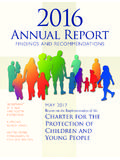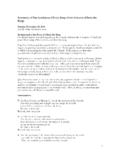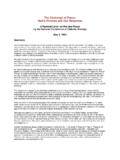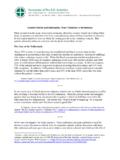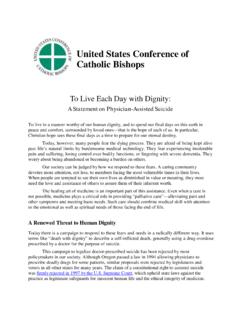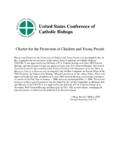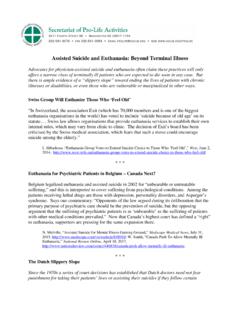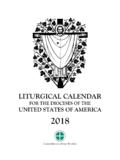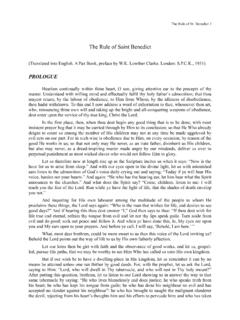Transcription of Economic Justice for All - USCCB
1 Economic Justice for All: Pastoral Letter on Catholic Social Teaching and the Economy 1986 United States Catholic Bishops Economic Justice for All: Pastoral Letter on Catholic Social Teaching and the Economy In November 1986, the National Conference of Catholic Bishops adopted Economic Justice for All: Catholic Social Teaching and the Economy. To mark the document s tenth anniversary, the Catholic bishops have issued two documents. A Decade After Economic Justice for All : Continuing Principles, Changing Context, New Challenges, which was approved in November 1995, is a pastoral reflection applying the message of Economic Justice for All to the economy of the 90s.
2 A Catholic Framework for Economic Life, which was approved in November 1996, outlines ten key principles of Catholic social teaching on the economy. This anniversary publication, which includes all three documents as well as updated suggestions for action, is authorized by the undersigned. Monsignor Dennis M. Schnurr General Secretary NCCB/USCC (1997) Excerpts from The Documents of Vatican II, Walter M. Abbott, SJ, general editor, copyright 1966, America Press, Inc., 106 West 56th Street, New York, NY are reprinted with permission. All rights reserved. Excerpts from Vatican Council II: The Conciliar and Post Conciliar Documents, Austin P.
3 Flannery, ed. (Collegeville, Minn.: Liturgical Press, 1975) are reprinted with permission. All rights reserved. Unless otherwise noted, Old Testament scriptural excerpts are from The New American Bible, copyright 1970, Confraternity of Christian Doctrine, Washington, ; New Testament scriptural excerpts are from The New American Bible, copyright 1986, Confraternity of Christian Doctrine, Washington, Both are used with the permission of the copyright owner. Copyright 1997, 2009, United States Conference of Catholic Bishops, Washington, All rights reserved.
4 No part of this work may be reproduced or transmitted in any form or by any means, electronic or otherwise, including photocopying, recording, or by any information storage and retrieval system, without permission in writing from the copyright Table of Contents A Pastoral Message: Economic Justice for All Why We Write / vi Principal Themes of the Pastoral Letter / vii A Call to Conversion and Action / ix Economic Justice for All Chapter I: The Church and the Future of the Economy / 1 A. The Economy Today: Memory and Hope / 2 B.
5 Urgent Problems of Today / 3 C. The Need for Moral Vision / 5 Chapter II: The Christian Vision of Economic Life / 8 A. Biblical Perspectives / 8 B. Ethical Norms for Economic Life / 15 C. Working for Greater Justice : Persons and Institutions / 22 D. Christian Hope and the Courage To Act / 28 Chapter III: Selected Economic Policy Issues / 32 A. Employment / 33 B. Poverty / 39 C. Food and Agriculture / 48 D. The Economy and the Developing Nations: Complexity, Challenge and Choices / 54 E.
6 Conclusion / 63 Chapter IV: A New American Experiment: Partnership for the Common Good / 72 A. Cooperation within Firms and Industries / 72 B. Local and Regional Cooperation / 74 C. Partnership in the Development of National Policies / 75 D. Cooperation at the International Level / 77 Chapter V: A Commitment to the Future / 81 A. The Christian Vocation in the World Today / 81 B. Challenges to the Church / 84 C. The Road Ahead / 88 D. Commitment to a Kingdom of Love and Justice / 89 v Economic Justice for All: Pastoral Letter on Catholic Social Teaching and the Economy A Pastoral Message Economic Justice for All Brothers and Sisters in Christ: 1.
7 We are believers called to follow our Lord Jesus Christ and proclaim his Gospel in the midst of a complex and powerful economy. This reality poses both opportunities and responsibilities for Catholics in the United States. Our faith calls us to measure this economy not only by what it produces, but also by how it touches human life and whether it protects or undermines the dignity of the human person. Economic decisions have human consequences and moral content; they help or hurt people, strengthen or weaken family life, advance or diminish the quality of Justice in our land. 2.
8 This is why we have written Economic Justice for All: A Pastoral Letter on Catholic Social Teaching and the Economy. This letter is a personal invitation to Catholics to use the resources of our faith, the strength of our economy, and the opportunities of our democracy to shape a society that better protects the dignity and basic rights of our sisters and brothers, both in this land and around the world. 3. The pastoral letter has been a work of careful inquiry, wide consultation, and prayerful discernment. The letter has been greatly enriched by this process of listening and refinement.
9 We offer this introductory pastoral message to Catholics in the United States seeking to live their faith in the marketplace in homes, offices, factories, and schools; on farms and ranches; in board rooms and union halls; in service agencies and legislative chambers. We seek to explain why we wrote the pastoral letter, to introduce its major themes, and to share our hopes for the dialogue and action it might generate. Why We Write 4. We write to share our teaching, to raise questions, to challenge one another to live our faith in the world. We write as heirs of the biblical prophets who summon us "to do the right and to love goodness, and to walk humbly with your God" (Mi 6:8).
10 We write as followers of Jesus who told us in the Sermon on the Mount: "Blessed are the poor in Blessed are the Blessed are they who hunger and thirst for You are the salt of the You are the light of the world" (Mt 5:1-6, 13-14). These words challenge us not only as believers, but also as consumers, citizens, workers, and owners. In the parable of the Last Judgment, Jesus said, "For I was hungry and you gave me food, I was thirsty and you gave me As often as you did it for one of my least brothers, you did it for me" (Mt 25:35-40). The challenge for us is to discover in our own place and time what it means to be "poor in spirit" and "the salt of the earth" and what it means to serve "the least among us" and to "hunger and thirst for righteousness.
